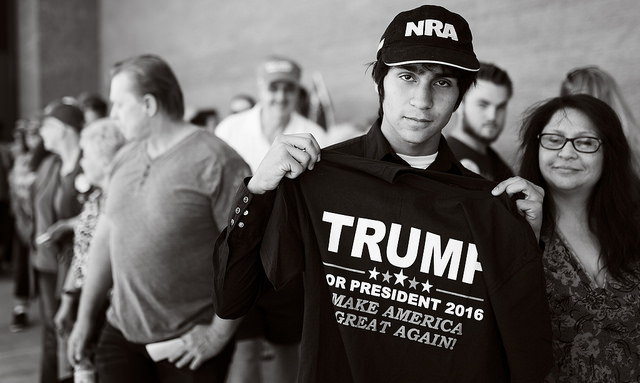
“Go ahead and denounce Trump’s lies and bigotry. Stand firm against his disastrous policies. But please don’t practice his trick of “otherizing” people into stick-figure caricatures, slurring vast groups as hopeless bigots. We’re all complicated, and stereotypes are not helpful—including when they’re of Trump supporters.” ~ Nicholas Kristof
.
I’ve been concerned about my reaction to people who voted for Trump.
I don’t like the feelings I hold in my heart toward them, and I don’t like that I’ve stereotyped them.
But then, it has made me realize that I stereotype people a lot.
Several weeks ago, when my husband and I pulled into the parking lot in the back of a used furniture store to do some shopping, I saw a man there working on the furniture.
Look at that Mexican guy working on the furniture, I thought. I bet he’s illegal.
Assuming the guy was Mexican (and that simply because he was Mexican, he was illegal) was the first stereotyping I did.
Within moments, I did it a second time.
I noticed that the man in the store who waited on us was effeminate, a bit fey, and he had several other male friends visiting the store who had the same mannerisms about them.
In my mind I concluded, They’re all gay. No wonder this is such a beautiful store.
See? It’s easy. It happens all the time. Even good, reasonable—liberal—people like me do it.
However, I don’t like this “knee-jerk” reaction I have. It’s wrong to jump to conclusions about others—no matter what the color of their skin, or their mannerisms, or how they’ve exercised their constitutionally guaranteed right to vote for who they want to vote for.
I’ve talked to my husband about my discomfort—especially about how many conclusions I jump to regarding Trump voters—and he emailed me an opinion piece on the subject that he thought might interest me.
“Trump is a demagogue who…tries to ‘otherize’ Muslims, refugees, unauthorized immigrants, and other large groups. It sometimes works when people don’t actually know a Muslim or a refugee, and liberals likewise seem more willing to otherize Trump voters when they don’t know any.” ~ Nicholas Kristof
In reading these two sentences, a light went on for me. When I “otherize” Trump voters, I am doing the very thing that Trump does himself.
“By all means, stand up to Trump, point out his lies and incompetence. But let’s be careful about blanket judgments.” ~ Nicholas Kristof
Kristof is right. Let’s be careful. What do such blanket judgments about other people get me anyway, other than to make me feel superior? Besides, when it comes to Trump voters, my criticisms and judgments certainly aren’t going to help turn the tide away from Trump.
Here are some reasons why:
- Stereotyping is not only unfair, it greatly impairs understanding.
- Hundreds of thousands of Trump supporters voted for Barack Obama.
- Many Trump supporters are themselves black, Latino, or Muslim.
- Stereotyping feeds the dysfunction and paralysis of our political system.
- Tolerance is a liberal value; name-calling isn’t.
- It’s hard to win over voters when you’re insulting them.
Politics aside, what does such thinking do to my desire to develop and maintain a compassionate heart for all humans?
Back at the furniture store, when I was checking out, I decided that it was simply none of my business what “orientation” the man behind the counter was. Gay, straight, in between—I didn’t even have to let the thought enter my mind.
On the way out of the store, the man who had been painting and repairing the furniture helped us load the dresser we’d bought into the back of our car.
I mentioned what a glorious day it was, and that we had just moved to San Diego.
“I was born and raised here,” he said. “It’s a great place to live. Welcome to California.”
So my assumptions about him—based on practically nothing in the first place—were dead wrong.
It’s probably a good bet that a lot of my assumptions about Trump voters are wrong too.
But then—just like I decided to do with the man behind the counter in the furniture store—it’s none of my business to judge them or come to conclusions about them. I don’t have to let such thoughts even enter my mind.
As Kristof says, “It’s just not helpful.”
~
Author: Carmelene Siani
Image: Flickr/Johnny Silvercloud
Editor: Yoli Ramazzina


 Share on bsky
Share on bsky




Read 0 comments and reply